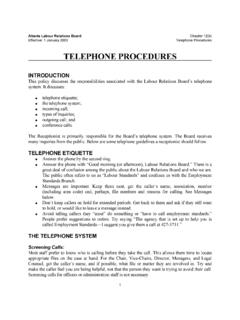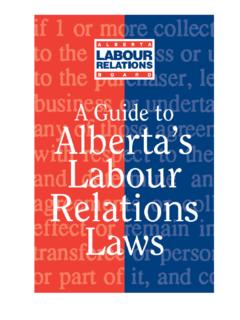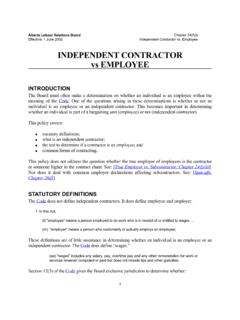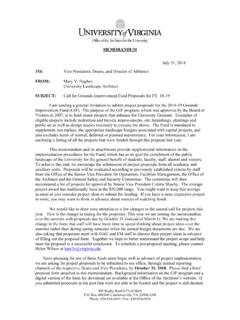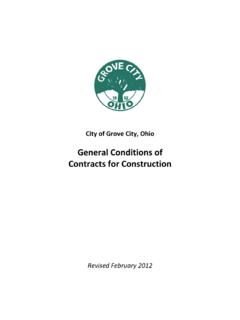Transcription of TRADE BARGAINING UNITS OUTSIDE CONSTRUCTION
1 Alberta Labour Relations Board Chapter 25(m) Effective: 1 December 2003 TRADE Union BARGAINING Rights OUTSIDE CONSTRUCTION TRADE BARGAINING UNITS OUTSIDE CONSTRUCTION INTRODUCTION Tradespeople work in many jobs that fall OUTSIDE the Labour Relations Code s definition of the CONSTRUCTION industry. The diversity of these work situations, and the employers who employ them, make it undesirable to adopt BARGAINING unit policies as firm as those in place for the CONSTRUCTION industry. In some areas of non- CONSTRUCTION employment, the Board believes relatively firm policies are desirable. In other areas, the Board can only describe the factors that will influence its judgment.
2 The Board decides the appropriate BARGAINING unit in each case after examining the circumstances of the particular employer and employees. This policy discusses the general considerations related to trades persons BARGAINING UNITS in the areas of: plants; maintenance contractors; labour brokers; and commercial fabricating shops, service, repair and speciality TRADE contracting. For information on CONSTRUCTION fabricating shops, see: [ general CONSTRUCTION , Chapter 25(g)]. See Information Bulletin #11 for more information on the Board s policy on non- CONSTRUCTION TRADE related BARGAINING UNITS . PLANTS The Board has found appropriate plant-type UNITS for manufacturing plants, petrochemical plants, tar-sands plants, power plants, mines and similar undertakings.
3 Normally the unit is described as: All employees [at the plant] except office, clerical, security and quality control personnel. This places operating and maintenance personnel in the same BARGAINING unit because, in the Board s view, separate maintenance TRADE UNITS disrupt orderly collective BARGAINING . Usually, the tradespersons are largely integrated with the operations employees. They share a strong community of interest with the operations group, rather than just with other craft employees. The Board normally excludes office and clerical employees from such UNITS . The Board has, however, also found all employee UNITS (comprising plant and office staff) to be appropriate despite concerns that mixed UNITS are dominated by the plant workers.
4 The Board has often left the unit description choice to the union. 1 Alberta Labour Relations Board Chapter 25(m) Effective: 1 December 2003 TRADE Union BARGAINING Rights OUTSIDE CONSTRUCTION maintenance CONTRACTORS Alberta industry relies heavily on the services of maintenance contractors. These contractors supply labour and expertise to maintain and repair industrial plants. They may perform ongoing maintenance work at a plant ( small M maintenance ), major maintenance work during a periodic shutdown ( big M maintenance ), or both. Frequently, contractors who are signatory to the general Presidents Agreement carry out these contracts.
5 The general Presidents of all major international CONSTRUCTION TRADE unions (except the Bricklayers) appoint an international representative to the general Presidents Committee. This multi- TRADE committee negotiates an industrial maintenance agreement for the project with the applicable maintenance contractor. The resulting general Presidents Agreement binds the contractor and the relevant local unions. When this is so, the employer has usually structured its operations to coincide with the various TRADE union hiring halls, relying, in their activities, on the traditional craft lines of the building TRADE unions.
6 In such circumstances, the Board has granted, and thinks it sensible to continue to grant, craft-based maintenance certificates. Even when contractors operating OUTSIDE the general Presidents Agreement provide similar maintenance services, the Board usually finds craft-based certificates, rather than all-employee UNITS , appropriate for collective BARGAINING . This is because it is usual industry practice for the plant owners to requisition employees on the basis of craft designations. This tends to be true whether or not the employer uses the union hiring hall. The pool of employees from whom these workers are taken overlaps the pool of regular CONSTRUCTION employees.
7 Often, the type of work performed requires TRADE qualifications to comply with the Apprenticeship and Industry Training Act. An example of a standard maintenance industry BARGAINING unit is: All maintenance Plumbers and Pipefitters. The trades are the same used for general CONSTRUCTION . This policy applies to maintenance contractors (performing big M maintenance ), not all maintenance work performed by any contractor. Many service and repair contractors perform small M maintenance work but are not in any way similar to the contractors whose specific business is engaging in long-term or turn-around industrial plant maintenance .
8 It is to this latter type of employer only that this policy applies. LABOUR BROKERS The use of labour brokers varies. In assessing an application for certification the Board examines the way in which the broker s clients usually requisition and employ employees. See: [Mead CONSTRUCTION Ltd. et al v OE 955 [1987] 79] and [Empire Iron Works et al v BSOIW 720 [1986] 167]. 2In some cases labour brokers describe their employees in other than the traditional TRADE terms. Sometimes they classify employees by level rather than craft. The Board s policy is to consider Alberta Labour Relations Board Chapter 25(m) Effective: 1 December 2003 TRADE Union BARGAINING Rights OUTSIDE CONSTRUCTION employees by actual job function rather than just by employer designation.
9 See: [Brauns CONSTRUCTION v. Labourers 92 [1992] Alta. 10]. Usually the Board applies the same appropriateness considerations that would be used for the type of work the employees are supplied to perform. However, the types of broker arrangements are so diverse that the Board cannot express any policy in the non- CONSTRUCTION area. The BARGAINING UNITS for CONSTRUCTION would apply equally to labour brokers where they are the true employers. COMMERCIAL FABRICATING SHOPS, ETC. Many fabrication shops are dedicated to a particular CONSTRUCTION project . For UNITS involving such shops, which are part of the CONSTRUCTION industry, see [ general CONSTRUCTION , Chapter 25(g)].
10 Another type of fabricating shop is a permanent shop that, as part of its business, manufactures modules for incorporation into CONSTRUCTION projects. This shop usually has a number of customers, probably manufactures certain catalogue items , and has a permanent location and work force. It may be producing CONSTRUCTION modules for different projects at one time, or in sequence. This category of shop covers a wide variety of employers, all employing tradespersons. In each case the challenge is the same. The employees often express a strong preference for representation by their craft union. However, a proliferation of craft UNITS within the employer s operations can cause disputes about work assignments, an onerous series of negotiations and perhaps serial strikes or lockouts as each TRADE , in turn, bargains with the employer.
